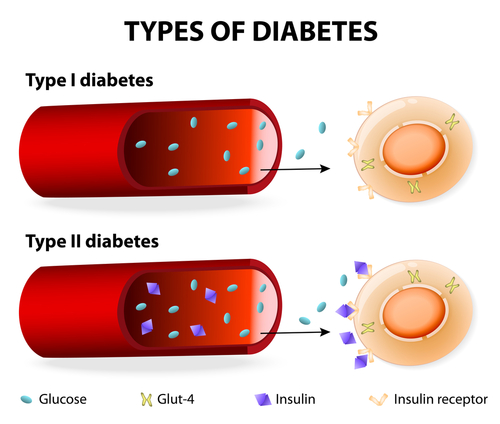
If you or someone you care for is unable to work due to Diabetes, read below for how the Social Security Administration can evaluate your claim for disability benefits.
The Bishop Law Firm has represented disability clients in North Carolina since 2009. If you are looking for a Diabetes disability lawyer, we do not get paid unless you win your case, and we offer free case reviews. Call us today or start your free case review online now.
What is Diabetes?
According to the CDC, Diabetes is a chronic health condition that affects how the body turns food into energy. Most food is turned into glucose, which is released into the bloodstream.
When this sugar (glucose) is released into the bloodstream, the pancreas should release insulin to convert it into energy.
Diabetes is an endocrine disorder because it disrupts hormonal regulation (U.C. Davis). In those with Diabetes, the pancreas does not manufacture adequate insulin hormone, so the sugar stays in the bloodstream (hyperglycemia).
In many instances, medication and lifestyle changes can alleviate the severity of Diabetes, but that is not always the case.
Types of Diabetes

There are two types of Diabetes: Type I Diabetes usually develops in younger individuals (and requires insulin), while Type II usually comes later in life. Unfortunately, per WHO, Type II diabetes is now occurring more frequently in children.
Either type of Diabetes can cause symptoms such as dry mouth, fatigue, blurred vision, frequent urination, and neuropathy. In some cases, even amputation and cardiac problems may result from your Diabetes. People with diabetes must be careful about their diet and monitor their blood sugar.
Also, Diabetics can be either insulin-dependent or non-insulin-dependent. Insulin can be administered to the body in different ways: needle and syringe, insulin pump, pens, inhalers, and even an artificial pancreas (via NIH).
Medications for Diabetes
In addition to insulin, non-insulin medications can be used in Type II Diabetes. Metformin; Januvia or Nesina (DPP-4 Inhibitors); Trulicity or Ozempic (GLP-1 and dual GLP-1/GIP Receptor Agonists); Brenzavvy (SGLT2 Inhibitors); Glipizide (Sulfonylureas) and Actos (TZD) (per the American Diabetes Association).
While advances have been made in Diabetic treatment, some patients have problems finding the proper medication for their Diabetes even with following strict diets and checking their blood sugar religiously.
Diabetic Complications
Unfortunately, brittle or labile Diabetes can also occur. When someone is a "brittle Diabetic," it means that they have uncontrolled Diabetes, resulting in moving from hypoglycemia to hyperglycemia quickly.
Fluctuating blood glucose levels can cause serious health problems for Diabetics. Diabetics can develop ulcers, so foot exams are essential.
Diabetic ketoacidosis is also a life-threatening complication of Diabetes. DKA occurs when the body does not have enough insulin for energy, so the liver breaks down fat, producing ketones. An abundance of ketones can turn your blood acidic (per the Mayo Clinic).
Unfortunately, Diabetes is associated with peripheral vascular disease, coronary artery disease, chronic heart failure, peripheral neuropathy, and kidney disease. Read our posts below for information on related diseases.
- Neuropathy (Diabetic Neuropathy or Nerve Damage)
- Amputation (Poor blood circulation)
- Charcot Foot (Rocker-Bottom Foot Deformity)
- Heart Failure (Coronary Artery Disease or Cardiovascular Disease)
- Blindness (Diabetic Retinopathy or Vision Loss)
- Stroke (Clots in blood vessels)
- Kidney Failure (Diabetic Nephropathy or Kidney Disease)
- Peripheral Arterial Disease
- Disability for Digestive Disorders
What types of Social Security Disability benefits are available?

The first step to attaining disability benefits for Diabetes is to complete an initial application for Social Security Disability. You can apply online or at your local SSA office. When you apply for benefits, SSA will determine what type of disability benefit you can apply for.
Social Security generally offers two types of Social Security Disability benefits: SSDI and SSI. While SSDI and SSI are separate Social Security Disability programs with different requirements, you must be found disabled before you are entitled to either benefit.
Social Security Disability Insurance (SSDI)
SSDI (Social Security Disability Insurance) is based on the credits from the work you have done in your life. You must be found disabled before your date last insured (DLI) to be found eligible for SSDI. Your DLI is calculated by counting your “quarters of coverage” from your earnings record. You must have 20 “quarters of coverage” of the last 40 quarters. Simply put, you must have worked 5 years of the previous ten years (in general) to be eligible for SSDI benefits. In addition, Adult Disabled Children can qualify for benefits from their parent’s account.
Supplemental Security Income (SSI)
SSI (Supplemental Security Income) is a need-based program, and you must meet income/asset standards in addition to being found disabled. In 2025, SSI is $967 per month for an individual and $1,450 for an eligible couple. SSI is reduced by 1/3 if you are receiving financial help from others. In NC, SSI recipients are also entitled to Medicaid.
SSI is also available for disabled children and is evaluated under a different standard than adults. Children must have a medically determinable physical or mental impairment or impairments (including emotional or learning problems) which result in marked and severe functional limitations, and the impairment(s) has lasted or can be expected to last for a continuous period of at least 12 months or be expected to result in death. Child SSI terminates when the child turns 18. The claimant will then have to reapply.
Social Security Disability for Diabetes Mellitus
As with all applications for SSA disability benefits, the name of your impairment is generally not as important as the severity of your symptoms.
Social Security defines disability as: "You must not be able to engage in any substantial gainful activity (SGA) because of a medically determinable physical or mental disability(ies) that is either: expected to result in death or as lasted or is expected to last for a continuous period of at least 12 months.
You must have medical records from your treating doctor that demonstrate that the symptoms from your Diabetes are severe enough to keep you from working and that the inability to work must last for 12 months or result in death.
If medication and lifestyle modification alleviate your symptoms, you will have a hard time attaining disability benefits. Disability benefits are awarded for diabetic patients when medical evidence demonstrates that they have problems controlling their blood sugar, and complications arise with disabling symptoms.
When I first started practicing Social Security Disability Law, there was a separate listing for Diabetes. The SSA removed this listing in 2011 despite protests.
SSR 14-2p
Despite SSA's removal of the Diabetes listing in 2011, they did issue SSR 14-2p, which discusses how they will evaluate a disability claim for Diabetes Mellitus.
As you will see in this ruling under Part II-C, the Social Security Administration now evaluates Diabetes under the body part that is affected by your Diabetes. For example, if you have to have an amputation due to your Diabetes, it will be evaluated under Listing 1.05, Amputation. Diabetic Retinopathy is evaluated under the vision loss listings: 2.02, 2.03, and 2.04.
The Medical-Vocational Guidelines (Grids)
In addition to the listings discussed under 14-2p, the SSA can use the Medical Vocational Guidelines (Grids) to find you disabled if you are 50 or older; and the symptoms from a combination of your impairments may also be used to find you disabled.
Social Security will use your symptoms, work history, and education level to determine your residual functional capacity (RFC). RFC is the most you can do despite your limitations. Your RFC will decide if you are disabled based on the Grids.
In my clients with Diabetes, obesity, neuropathy, and high blood pressure frequently co-occur. Social Security should aggregate the symptoms of all your impairments to determine if you can work.
Unfortunately, in some instances, even when high blood sugar levels are controlled, there can still be severe complications from Diabetes. With severe symptoms, such as vision loss or Charcot Foot, a doctor may have to prescribe prednisone (steroid) to halt the inflammatory process.
Steroids increase blood sugar levels in people who have Diabetes. This can leave a Diabetic patient in a terrible position, which should definitely be pointed out to the Social Security Administration (SSA).
Do you need an Experienced Diabetes Disability Lawyer?

Having an experienced disability lawyer on your side can help you understand what SSA needs from you to find you disabled. In addition to reported symptoms, you need medical records demonstrating that you have followed medical advice and still are unable to work due to your Diabetes.
We advise our clients not to worry about meeting a listing! If you meet a listing, working has been off the list for quite some time. If you cannot work because of your health, apply for benefits immediately. Delay may cause you to lose benefits.
The Bishop Law Firm can help if you need a Social Security Disability Lawyer. We have represented many clients at DDS (Disability Determination Services), at the hearing with the Social Security Administration Administrative Law Judge, the Appeals Council (AC), and in District Court (DC).
We represent disability clients in: Raleigh, Durham, Fayetteville, Cary, Rocky Mount, Wilson, Smithfield, Louisburg, Chapel Hill, Roanoke Rapids, Winston Salem, Garner, Greensboro, Greenville, and surrounding areas in North Carolina.
We do not get paid unless we win, and we offer free case reviews. Call us today or start your free case review online now.

